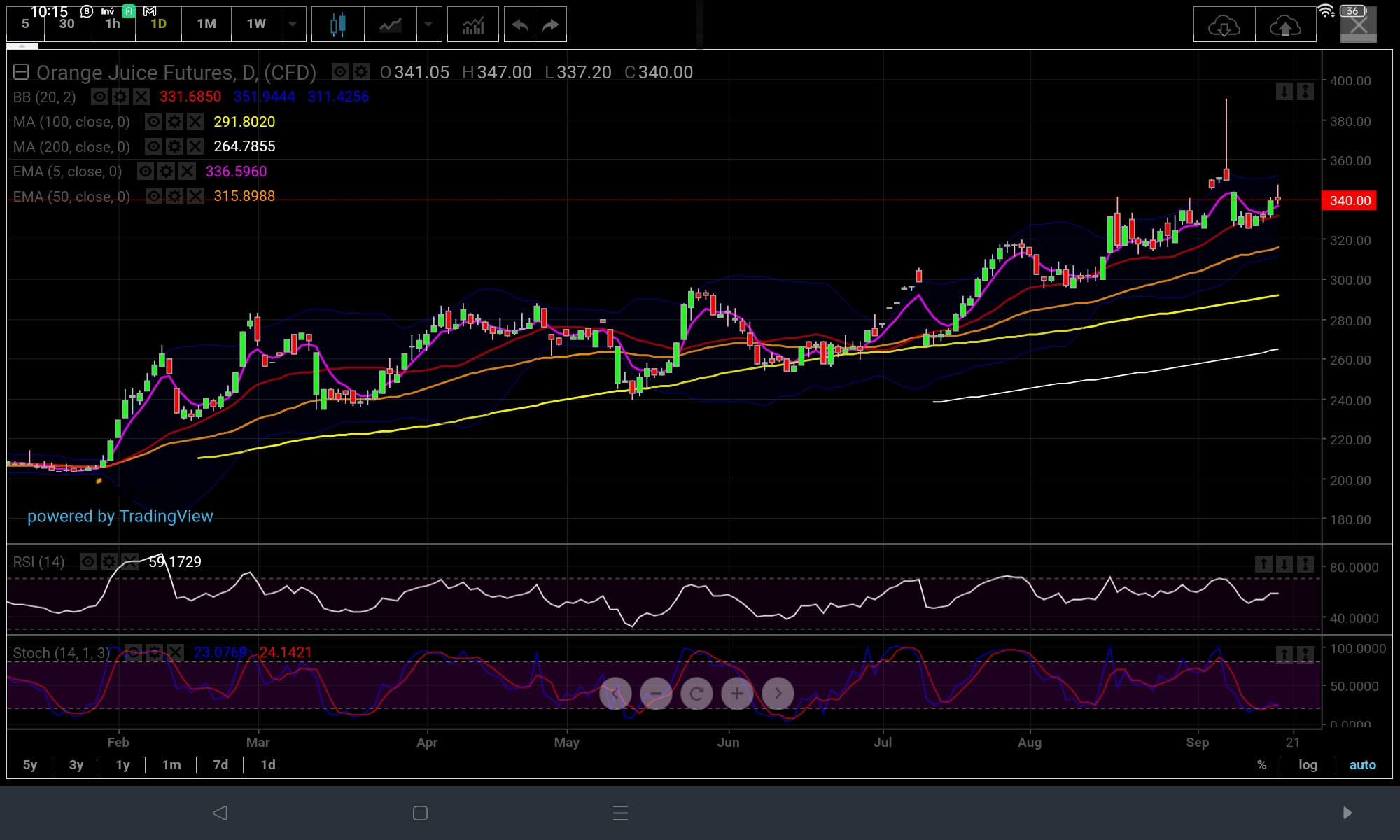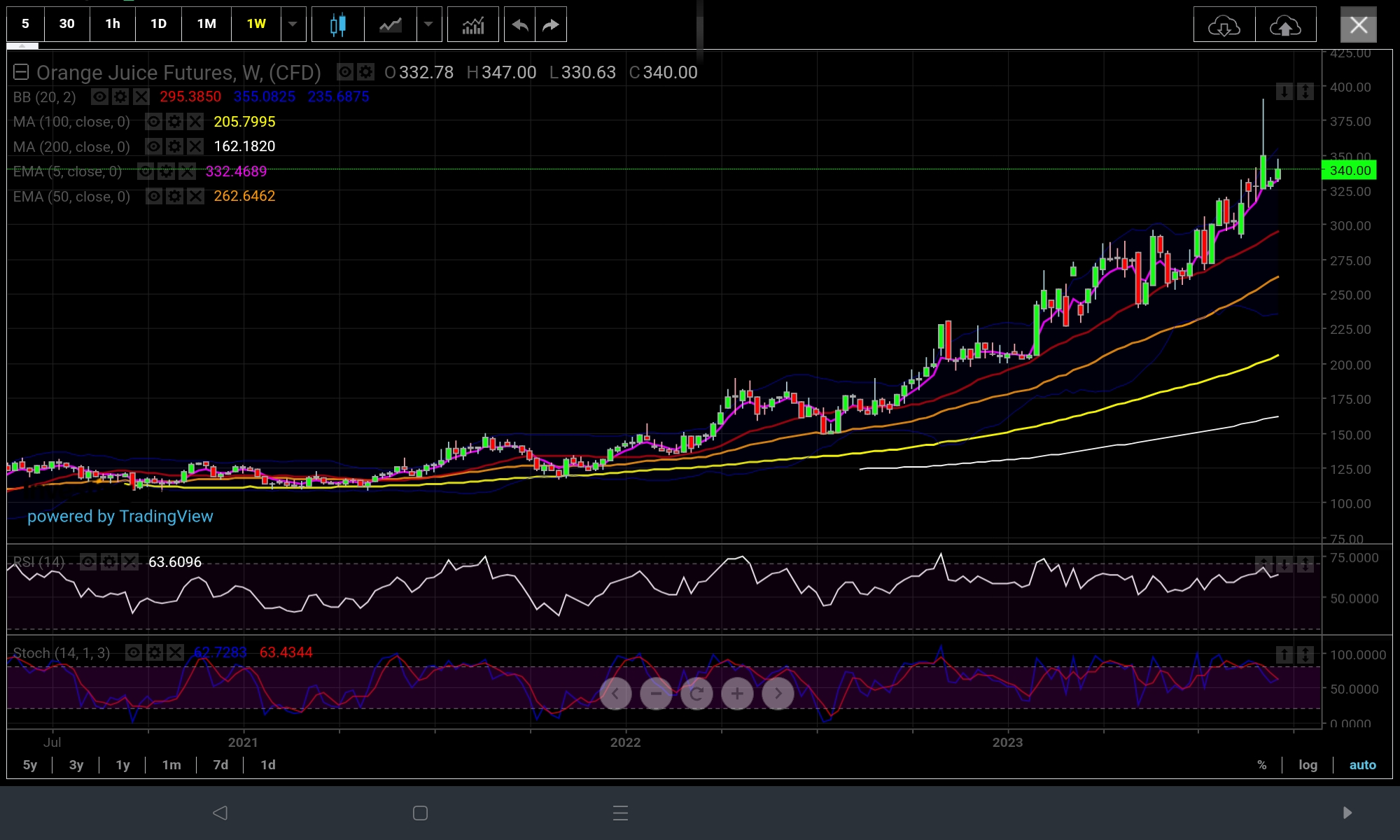- Juice prices up 25% since June, hitting record high of $3.90/lb on Sept. 8
- Storm risks aside, greening disease has dealt blow to harvests in Florida, Brazil
- FCOJ futures need to stay above $3.50 to make a run for new high, charts show
To bulls in orange juice futures, every bit of data on the market now is as sparkling as that ubiquitous citrus drink.
From a record high just shy of $4 a lb struck under two weeks ago, frozen concentrated orange juice, or FCOJ, futures could be poised for another all-time peak if storm risks over America’s orange state of Florida do not abate.
While the peak of the hurricane season has officially passed the Atlantic, the tropics remain extremely active, weather forecasters said.
"A non-tropical area of low pressure is expected to form east of the Florida peninsula late this week," the National Hurricane Center said. "This system could acquire some subtropical characteristics this weekend while it moves generally northward."
Jack Scoville, chief crop analyst at Chicago’s Price Futures Group, puts that within a FCOJ point of view:
“Traders are wary about selling futures due to the hurricane season that could bring a storm to damage crops in Florida again. Hurricane Lee was the latest storm, but the track has kept it away from the southeast U.S. Another storm is forming in the Atlantic now to bring more risk to the start.”
Florida’s all-citrus production in 2022-2023 is 18.1 million boxes, down 60% from the previous season’s 45.3 million boxes, the US Department of Agriculture, or USDA, said. All orange production decreased by 62% to 15.8 million boxes, the agency added.
In top citrus-producing country Brazil, forecaster CitrusBR recently estimated stocks at 84,745 tons for last season. That was the lowest estimate since 2012, when data collection started, and stocks were estimated below 100,000 tons.
In a Price Futures Group report issued Tuesday, Scoville wrote:
“Reports of short supplies in Florida and Brazil are around. Production for next year is expected to drop a bit due to weather concerns. Futures remain supported by very short Orange production estimates for Florida. Futures are also being supported in forecasts for an above-average hurricane season that could bring a storm to damage the trees once again.”
“Historically low estimates of production due in part to the hurricanes and in part to the greening disease that have hurt production, but conditions are significantly better now with scattered showers and moderate temperatures.”
It’s Not Just Weather; It’s Crop Disease Too
Weather aside, a form of crop disease called “greening” has struck deeply into the orange groves of Florida and Brazil.
Citrus production for next year is expected to drop further due to weather and disease concerns, Luckbox Magazine said in an extensive report on the citrus market published earlier this month.
“Futures remain supported by very short orange production estimates for Florida,” Luckbox said in the report. “Futures are also being supported in forecasts for an above average hurricane season that could bring a storm to damage the trees once again.”
Historically low estimates of production due in part to the hurricanes and in part to the greening disease that has hurt production, but conditions are significantly better now with scattered showers and moderate temperatures.
One of the primary drivers of lower yields in Florida has been the spread of a disease known as "citrus greening," which, according to the USDA, is the "most serious citrus plant disease in the world."
Citrus greening is also referred to as Huanglongbing, or HLB — a yellow dragon disease that spreads via an insect known as the Asian citrus psyllid.
Trees infected by HLB produce misshapen, bitter fruit, which is considered unsuitable for sale as fresh fruit or juice. There is no known cure/treatment for HLB, and trees that are infected by the disease usually die within three years.
It should be noted that citrus greening is not harmful to animals or humans.
According to research conducted by the University of Florida, citrus greening has devastated roughly 162,000 acres of citrus groves in Florida since 2007. And revenue lost to orange growers over that period is estimated at nearly $8 billion.
As if that wasn't enough, the Florida citrus industry has also lost trees due to extreme weather and floods associated with hurricanes (like Ian and Nicole). On top of that, the 2023/2024 orange harvest was also negatively impacted by a late freeze, which damaged budding trees.
At the start of last year, orange juice futures were trading for roughly $1.25/lb. Today, however, that same contract is trading for nearly triple that value of $3.50/lb.
That's significant because prior to the start of this year, the previous all-time high in orange juice futures during the 21st century was about $2.20/lb.
Regionally, two of the most important producers of orange juice are Brazil and the United States, which constitute some 85% of the market. In the United States, the states of California, Florida, and Texas produce the bulk of the country's oranges.
However, the oranges used to make juice are heavily concentrated (pun intended) in Florida. And that's because the climate in Florida is hotter and wetter as compared to California and Texas, which yields fruit generally sweeter and juicier.
Considering those market dynamics, one can see how prices might be extremely sensitive to any supply-side disruptions in Florida. And that's why the current crisis in Florida's orange growing areas has been such a key factor in the recent orange juice rally.
As a result of both disease and subpar growing conditions, orange harvests in Florida have been steadily declining in recent years. According to CNN, the 2022-2023 growing season yielded about 50% fewer oranges than the 2021-2022 growing season, totaling about 16 million 90-lb boxes of oranges.
To put that number in context, 16 million boxes represent a 93% decline from Florida's peak output and the weakest harvest since the end of World War II. In comparison, Florida pumped out upwards of 240 million boxes annually as recently as 1998.
The meager 2023 harvest has undoubtedly contributed to the current spike in prices, as highlighted below.
Due to these significant headwinds, it's expected that 2023 will be the first year in history in which the California orange harvest is larger than Florida's.
Juice Prices: A Technical Outlook

Following the record high of $3.90 per lb struck on Sept. 8, FCOJ’s November front-month on ICE Futures US has ranged between a session low of $3.25 and an interim high of $3.47.
Sunil Kumar Dixit, chief technical strategist at SKCharting.com, said November FCOJ’s immediate support had been established at the 50-day Exponential Moving Average, or EMA, of $3.15.
“The 5-week EMA of $3.32 is the first line of support that needs to hold for bullish continuation, failing which, the downward correctional wave starts towards the Weekly Middle Bollinger Band of $2.95,” said Dixit. “If there’s a break below that zone, we can expect the decline to extend to the 100-day SMA, or Simple Moving Average, of $2.91.”
But the market’s current momentum means a greater likelihood of FCOJ trying to target a new peak, added Dixit.
“The way I see it, the $3.55 level is an interim resistance,” he said. “Clearing through this can extend the upside potential towards the $3.90 record high.”
***
Disclaimer: The content of this article is purely to inform and does not in any way represent an inducement or recommendation to buy or sell any commodity or its related securities. The author Barani Krishnan does not hold a position in the commodities and securities he writes about. He typically uses a range of views outside his own to bring diversity to his analysis of any market. For neutrality, he sometimes presents contrarian views and market variables.
